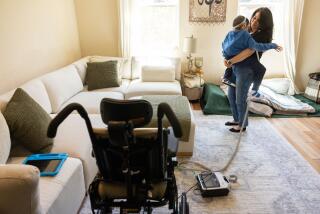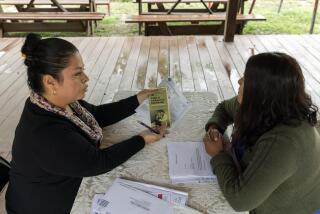Elderly, Disabled Biggest Users of Medicaid : Health: Reform is high on the political agenda. But the highest-cost recipients are unlikely HMO candidates.
- Share via
SILVER SPRING, Md. — At a cost of $41,000 a year, it doesn’t take long for the elderly residents of the Arcola Nursing & Rehabilitation Center to qualify for Medicaid.
Some of the 156 residents are recuperating from strokes, broken bones or other bouts of illness and may go home after a few months of care.
Others are in the end game of a battle against Parkinson’s, Alzheimer’s and other diseases; they will likely end their days here or in another long-term care facility.
Most are octogenarians who once led prosperous, middle-class lives. Now 72% rely on Medicaid to pay their nursing home bills.
Reform of Medicaid is high on the agenda of the Republican leaders of Congress and the nation’s governors, who are rushing to move their Medicaid recipients into managed care. But the reality of Medicaid’s cost spiral is that the most of the budget is spent on elderly and disabled recipients who are the least likely candidates for health maintenance organizations.
Medicaid costs have exploded in the last five years, from $61 billion spent on 24 million poor or medically needy people in 1989 to an estimated $163 billion for 32 million today. Medicaid now claims almost $1 of every $5 spent by state governments.
While politicians decry the expense of welfare recipients showing up at hospital emergency rooms for routine care, most of the 16 million children and 7 million low-income adults on Medicaid do not run up big medical bills.
Although these children and adults comprise almost three-quarters of Medicaid recipients, they account for only a third of spending, according to figures compiled by the Kaiser Commission on the Future of Medicaid.
Five million disabled beneficiaries and 3.7 million elderly make up 27% of the enrollees, but two-thirds of the spending.
In 1993, Medicaid spent an average of $1,360 per child and $2,292 per non-elderly adult, but $9,226 on the blind and disabled and $9,862 on the elderly.
States from Tennessee to Oregon have looked to save money and expand coverage by shifting Medicaid beneficiaries into HMOs. The Clinton Administration has given eight states waivers to experiment with Medicaid managed care, and nearly a score of other states are waiting in line for permission.
“While you can try to make some savings in Medicaid on managed care, managed care is not applied to all of what we spend on Medicaid today,” said Diane Rowland, executive director of the Kaiser study panel.
While policy-makers are eager to get able-bodied Medicaid recipients to go to clinics or private physicians instead of emergency rooms, “we haven’t wanted to go into nursing homes and discharge people and put them back on the streets,” she noted.
Medicaid also pays for intermediate-care facilities for the mentally retarded and picks up the medical bills for children with severe disabilities.
“Medicaid is the most unmanaged model of medical care in America. It’s crisis-oriented,” said Dr. Rogers K. Coleman, president of Blue Cross and Blue Shield of Texas, which is bidding for new Medicaid managed-care business.
A study commissioned by a think tank for Blue Cross plans, the National Institute for Health Care Management, found that while more than 7 million Medicaid recipients are enrolled in managed care, 93% of Medicaid payments “are still made on a fee-for-service basis.”
A third of the Medicaid managed-care recipients are in case-management programs where their care givers are still paid for every fee they charge rather than flat rates, the study found.
Medicaid pays 48% of the nursing home bills in this country. Medicare pays less than 5%. Medicare only pays for skilled nursing required while someone recovers from an illness, not for custodial care.
Eamonn Reilly, administrator of Arcola, said few people can afford to stay in a nursing home for long on their own resources.
They “eventually convert to Medicaid. Because of the costs associated with coming here, if they have private funds, they’re exhausted quickly,” said Reilly.
Bret D. Stine, administrator of the Kensington Gardens Nursing Home and Rehabilitation Center in nearby Kensington, Md., owned by Global Health Management, the same company that runs Arcola, said asset divestiture “represents what’s wrong with our system. It’s indicative of the fact that long-term care is expensive and there are no sound third-party resources out there.”
More to Read
Sign up for Essential California
The most important California stories and recommendations in your inbox every morning.
You may occasionally receive promotional content from the Los Angeles Times.













